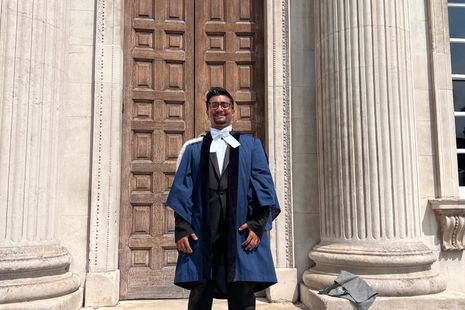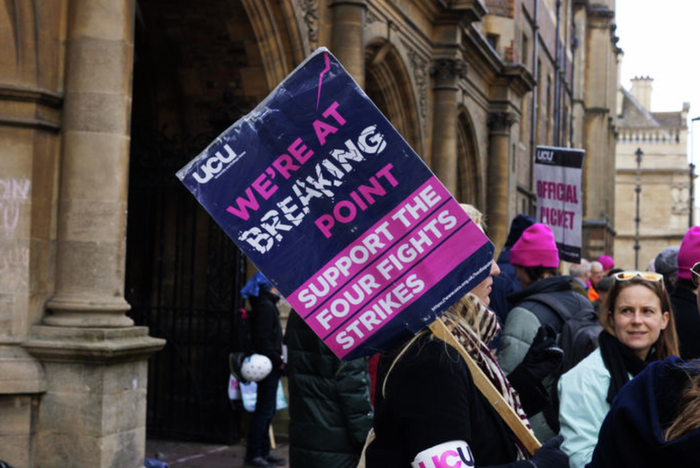Sham graduations and the farce of provisional results
Faced with the disruption of the marking boycott, students are entitled to blame academics and administrators

Upon exiting Senate House after an all but identical ceremony this year, only a few of us were handed degree certificates. I was not one of them, nor were most of my friends.
Most of my cohort participated in graduation “ceremonies” before knowing any of our marks; some had provisional marks for a few papers and only a fortunate few had a final and immutable degree classification. Yes, most of us had chosen to participate in the ceremony. Who wouldn’t? We wanted to celebrate our degrees with our friends and families at the earliest opportunity. But for those of us who had not received our marks, provisional or otherwise, there was an air of hesitancy to the obvious “what’s next?” question from our friends and their parents. All of this because of a bottleneck, preventing us from progressing straightforwardly onto the next stage of our lives.
More and more students are becoming tired of the Marking and Assessment Boycott (MAB). It is a callous “action short of strike” and striking academics should acknowledge students’ growing resentment towards it. Striking and refusing to complete the central service of your department – marking exams – has, like most strike action in Cambridge, affected certain groups of students far more than others. Linguists and Historians, along with English and HSPS students, have received nothing, while final year lawyers, Phys Natscis, Classicists, Mathematicians and Engineers received final marks.
“Provisional marks are even worse: you don’t know if you’ve done provisionally well or badly”
The uncertainty created by the boycott is wearisome for students who are completely in the dark about their futures until September. Certain students don’t have a concrete publication date or know which papers will be marked. Faculties are also not necessarily following the same procedures: university policy says departments decide whether to accept provisional marks for tripos switchers or master’s offer holders. DoSes and Tutorial Offices have their hands tied behind their backs: at our “graduation” dinner, one Caius fellow on college council could only offer words of consolation when they heard that one of their students would have to wait until October to know if they’d be coming back to Cambridge for a fourth year. Provisional marks are even worse: you don’t know if you’ve done provisionally well or badly and there’s often no clarity about how much your marks may be adjusted in the final examiner’s meeting or even the basis that these provisional marks have been calculated.
A marking boycott is far more disruptive than a conventional strike or a research boycott – that’s the point: participating academics want to attract media attention and stir up criticism against the UCEA (the body representing university employers in pay negotiations). They hope that it will push students, parents and the wider public to scrutinise the problems in higher education that have driven so many academics to this point. So far, this has been largely unsuccessful: most people in the “real world” simply don’t care about the toils of academics stuck in their ivory towers.
Some students have directed their efforts towards calling for the UCEA to restart negotiations with the UCU, which are now going ahead. Nearly every Cambridge student has seen a PhD or postdoc repeatedly rolled out as their department’s lackey. A Varsity interview with striking academics criticised a “disrespectfully inept payment body” and declared that “it’s more important than ever to apply pressure on the UCEA for a just a respectful agreement”. Across the UK, university chiefs have been taking vindictive action against staff participating in industrial action: George Boyne from the University of Aberdeen said that he wanted to inflict “pain” on his staff. Funding models are turning universities into corporate machines and humanities departments, which are disproportionately involved in the MAB, are systematically underfunded. I’ve seen supervisors – often in junior and untenured positions, more than often women or people of colour – overworked and stretched to their limits in supervisions and research with limited prospects for job progression.
“There is a group of students who have been fervently against the strike action since its inception”
However, not all students are sympathetic to these arguments. There is a group of students – though I still think a minority – who have been fervently against the strike action since its inception, anticipating the serious problems that would affect them, particularly if they have job opportunities or postgraduate study lined up after graduation.
Certain striking academics are using their positions as a power-play, guilt-tripping students concerned about their own circumstances into feeling repentant if they’re not on the UCU’s side. Nick Guyatt told Varsity that in his day he had a “crazed respect” for his supervisors. Perhaps he thinks this has been lost by a growing number of students who are not in support of the boycott. This is the same academic who tweeted two months ago that “genuinely if you work at Cambridge you know that the villainous students are massively outnumbered by the wonderful students, but SO MANY of the villains graduate into prominence, power and uber-villainy”. Any graduating student would be equally “crazy” to put their lives on pause to support certain – though, of course, not all – striking academics in the UCU who feel comfortable criticising their own students online and have convinced themselves that their own career woes trump those of their students. Even worse though, this boycott has taken a central element of choice out of our hands, though we’re all paying upfront for a service (£9,250 anyone?) with no immediate chance for compensation if what the university provides us is subpar.
If you don’t support the strikes or are frustrated by the delay in receiving your grades, you are entitled, no matter what any academic tells you, to cast blame on University administration and the striking academics – who have been taking your support for granted and have taken your grades hostage in their employment disputes. The new Vice-Chancellor’s recent acknowledgement that the current cohort of graduates have been “dealt a terrible hand by fate” may feel like validation – which we’ve been conditioned by our striking lecturers into thinking that we’re not allowed to feel.
 News / Cambridge students set up encampment calling for Israel divestment6 May 2024
News / Cambridge students set up encampment calling for Israel divestment6 May 2024 News / Cambridge postgrad re-elected as City councillor4 May 2024
News / Cambridge postgrad re-elected as City councillor4 May 2024 News / Proposed changes to Cambridge exam resits remain stricter than most7 May 2024
News / Proposed changes to Cambridge exam resits remain stricter than most7 May 2024 News / Some supervisors’ effective pay rate £3 below living wage, new report finds5 May 2024
News / Some supervisors’ effective pay rate £3 below living wage, new report finds5 May 2024 Fashion / Class and closeted identities: how do fits fit into our cultures?6 May 2024
Fashion / Class and closeted identities: how do fits fit into our cultures?6 May 2024






